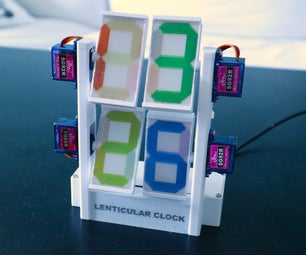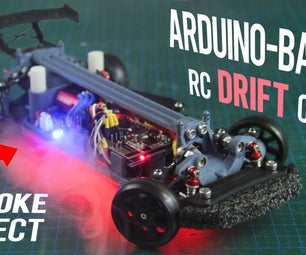Introduction: Arduino Based Mini Arcade Cabinet
Duinocade is a very small arcade cabinet (14cm / 5,5inch height).
The software and parts of the circuit diagram based on the open source handheld Gamebunio, which based on the famous Arduino platform. The Gamebuino and also our Duinocade uses the known Nokia 5110 lcd as screen. At the moment al lot of known retro games are available for this platform for example Pong, Space Invaders, Pac Man, Breakout, Asteroids ....
I've hacked not only the Gamebuino but also an Arcadie Dual gamedock for the case. It is much smaller as the Arcadie gamedocks of my other projects and also cheaper.
The electronic is realized on a breadboard.For electronic noobs a a DIY kit with an assembled and pre programmed pcb is available in my webshop. In contrast to the Gamebuino we don't have a lithium battery and an USB port. The Duinocade is powered by an external (wall) power supply. The electronic fits in the slot for the iPhone. We don't have to made mechanical modifications of the case except one additional hole for the power socket. We've mounted only an 3,3V power supply, the ATMEGA328 microcontroller, SD card socket and the Nokia LCD on this breadboard/pcb.
Please visit my website for more information.
Step 1: Tools & Materials
Tools:
- soldering iron
- electronic side cutter
- flat nose pliers
- simple drilling machine
Materials:
- 1x Arcadie Dual gamedock
- 1x breadboard 160 x 100 mm
- 1x ATMEL ATMEGA328 microcontroller
- 1x 16MHz crystal
- 2x 15pF disc capacitor
- 2x 100nF disc capacitor
- 1x 220uF/25V electrolytic capacitor
- 1x 10uF/10V electrolytic capacitor
- 1x 10K resistor
- 1x 470 Ohm resistor
- 1x BC547C transistor
- 1x Nokia5110 lcd
- 1x Loudspeaker > 50 Ohm
- 1x push button for THT mounting
- 1x MCP1702-3302E/TO
- 1x 2x3 pole header
- 1x 8 pole ribbon cable & header
- tin-solder
- hookup wire
- double-sided adhesive tape
Step 2: Disassemble the Arcadie Enclosure
- Remove the both screws (behinde the stickers) at the right and left side of the enclosure
- Cut the cable between joystick unit and rear cover
- Remove the rear cover
- Remove the joystick unit
- Open the rear cover
- Remove all electronic and mechanical parts inside the rear cover
- drill an 7mm hole to the rear cover
Step 3: Remove All the Stickers Outside
remove the stickers outside the main enclosure, of the backside from rear cover and from the joystick unit. I'm using a label removing spray based on citric acid.
Step 4: Prepare the Joystick Unit
- disassemble the pcb
- remove all original cables from the pcb of joystick unit
- solder the ribbon cable with header to the button and joystick of the pcb according the circuit diagram
- assemble the pcb again
Step 5: Soldering, Programming and Initial Operation of Pcb
- cutting the breadboard in this way that it will fit later perfectly onto the rear cover
- now you have to solder all the parts to the breadboard according the circuit diagram and the pictures above
- connect now the pcb with an power supply
- upload the firmware with an USB programmer in the ATMEGA328
For electronic noobs: An full assembled and pre programmed pcd is available in our webshop!
Step 6: Assembly of Rear Cover
- glue the socket for the power supply behind the hole in the back side of rear cover
- close the rear cover (don't forget to assemble the interlocking part)
- mount all screws
- mount the pcb with self adhesive tape
- cut an bezel from black card (you will find a simple pattern on my website)
Step 7: Place the Artwork
Place the art work stickers out side of the main enclosure. You will find different art works (Pong, Pac Man, Space Invaders, Donkey Kong) on my webside.
Step 8: Final Assembly
Now its time to assemble the joystick unit in the main enclosure. At the end we have to mount the rear cover in the main enclosure (we don't need the both screws - it fits also without these screws)

Participated in the
Gadget Hacking and Accessories Contest












